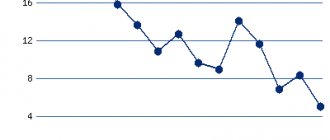One of the main goals of the modern policy of the Central Bank of the Russian Federation is a global purge among financial institutions, aimed at removing unscrupulous creditors from the financial arena. This position and the revocation of licenses from many banking organizations cannot but worry Russians who are accustomed to keeping their savings in accounts and open deposits. Indeed, under such conditions, it becomes difficult to understand which bank to give preference to, whether there is a guarantee of the safety of its license.
Financial expert analysts strongly recommend giving preference to such financial institutions, cooperation with which is guaranteed to be protected from any risks. That is, all Russians should know the list when applying for services from systemically important banks. After all, almost every contemporary of ours is a bank client.
Systemically important banks are supported by the state
History of creation
Analysts and experts associate the appearance of the list of systemically important banks with the mass practice of revoking licenses from credit institutions. The peak of this financial market purge occurred in 2014. It was then that the Central Bank decided to draw up a list of systemically important banks. This emphasized that the sustainable operation of these companies is important for the Russian economy as a whole.
The list was created for potential clients of financial and credit organizations. The Central Bank pointed to banks that received government support during the crisis. However, despite the prepared document, which included 50 companies, there was no publication. The reasons for this decision are unknown.
In 2015, employees of the Central Bank of the Russian Federation developed a new methodology for identifying systemically important banks, which was reflected in Directive No. 3174-U dated July 22. The regulatory act contained a clear procedure for compiling a list of such financial and credit institutions.
Initially the list contained 10 banks. Subsequently, the Central Bank decided to expand it to 11. The last approved financial and credit institution was the Moscow Credit Bank.
Why did the list of systemically important banks appear at all?
We all remember the situations with high-profile license revocations in 2014-2017-2018, including those of banks, which at first glance seemed reliable and unsinkable. Depositors and counterparties of banks, after such events, were in complete confusion, so after such actions of the Central Bank, any bank seemed unreliable.
The regulator needed to prevent further panic and show that there are banks that have nothing to fear. Banks from the above list can count on government support, especially considering that half of them already have government participation.
For ordinary depositors, such a list is an indicator of the reliability of the selected credit institution. After all, working with such systemically important banks is much calmer.
List
As of 2021, the following are recognized as systemically important banks of the Russian Federation:
- Sberbank;
- VTB;
- Opening;
- Gazprombank;
- Rosbank;
- Rosselkhozbank;
- UniCredit Bank;
- Alfa Bank;
- Raiffeisenbank;
- Promsvyazbank;
- Moscow Credit Bank (MCB).
Do not assume that the above list is not subject to change. The listed financial and credit institutions must meet strict requirements for short-term liquidity and have sufficient capital.
Selection criteria
In addition to the size of assets, the Central Bank of the Russian Federation has established a number of requirements for banks applying for inclusion in the list under consideration:
- liquidity ratio of at least 60%;
- the financial institution has its own capital;
- issued loans, attracted deposits and deposits of the population and private companies are monitored;
- the number of transactions carried out within the interbank market;
- additional capital adequacy requirements (Basel III).
The list includes only those financial and credit institutions that fully comply with the stated parameters.
Status for 2021
The last systemically important participant was the Moscow Credit Bank. This happened in 2021. According to insider information received from the Central Bank of the Russian Federation, there are currently no other financial and credit organizations that would qualify to be included in the list under consideration. However, this does not mean that similar candidates will not appear in the future.
According to statements made by representatives of the country's main financial regulator, a revision of the approach to the indicators and criteria of systemically important banks is possible in the future. The assessment methodology is constantly being improved. The situation with tightening requirements for current participants and candidates looks realistic.
Main rules
To fully guarantee the preservation of funds, citizens should keep no more than 1.4 million rubles in one bank, advises Vasily Solodkov. In the event of a bank's bankruptcy, the deposit insurance system will allow it to return the money, recalls Yuri Gribanov. He also recommends that depositors make sure that they have an agreement on concluding a transaction with the bank and receipts for depositing funds. The Deposit Insurance Agency, in the course of preparing and carrying out insurance payments, periodically encounters double-entry bookkeeping - when the official accounting records do not reflect information about open deposits of citizens or funds are written off from accounts without the knowledge and consent of their owners. According to the DIA report, in the first half of 2021, 3.1 thousand depositors who held 3.6 billion rubles on deposits suffered from such actions of two banks. When determining the “safe” deposit amount, you should remember that the insurance amount is 1.4 million rubles. includes accrued interest, Solodkov recalls. “Therefore, you need to keep an amount less than 1.4 million rubles on deposit. Owners of foreign currency accounts should keep in mind that if the license is revoked, insurance compensation will be paid in rubles and a currency risk arises,” he notes. The expert also advises, in any case, to avoid so-called vacuum cleaner banks that offer rates significantly (several percentage points) higher than the market average (you can focus on the rates published by the Central Bank) and conduct an extremely aggressive advertising campaign to attract depositors. Expensive deposits can reduce the financial stability of banks, experts warn.
Reliability and guarantees
In the situation with systemically important banks, ordinary depositors are interested in the issue of trust. Is it safe to open a deposit in a financial institution from the list above?
The Central Bank of the Russian Federation does not provide official guarantees for the bright future of such banks. However, this does not mean that if difficulties arise, they will be abandoned to their fate.
On the contrary, as practice shows, the main regulator in our country does not revoke the licenses of financial institutions from the list, even when the latter are experiencing serious financial difficulties. Instead, a procedure is being carried out to reorganize or rehabilitate the company.
A striking example is the situation with Otkritie Bank.
In mid-2021, this financial and credit institution began to experience global financial difficulties and found itself on the brink of disaster.
The beginning of July was marked by an announcement from the Analytical Credit Rating Agency or ACRA, which assigned the Otkritie FC company a downgraded investment rating of BBB-.
This news had the effect of a financial bomb exploding. The reaction to it was a massive withdrawal of funds from the financial and credit institution in question by state-owned companies, commercial structures and individuals. The widespread closure of accounts made the bank's position even more precarious.
By the end of the summer of 2021, there was a corresponding reaction from international rating agencies, which also lowered the rating of FC Otkritie.
It was the fact that the financial and credit organization belonged to systemically important banks that saved the situation. At the end of August, the Central Bank of the Russian Federation began the reorganization procedure. The regulator took on the main financial burden. As the main shareholder, the Bank of Russia began pumping colossal money into Otkritie FC. The source of investment was the Banking Sector Consolidation Fund.
Simultaneously with these actions, an official statement was made according to which the Central Bank of the Russian Federation guaranteed that FC Otkritie would continue to function as usual.
Naturally, such a financial collapse did not go unnoticed. The systemically important bank in question subsequently had to abandon some of its previously assumed obligations. These actions affected Eurobonds with a total face value of one billion US dollars.
Financial difficulties of a smaller scale in recent years have also affected other financial and credit institutions on the list. For example, problems arose at Rosselkhozbank, MKB and Promsvyazbank. However, we were talking about local crises that were overcome in a short time.
Description of the concept
Credit and financial institutions whose activities can have a significant impact on the entire banking sector of the country are called systemically important banks. If the financial situation of such a player becomes precarious, then government authorities take various methods of its recovery - reorganization. They also prevent its liquidation or bankruptcy.
In addition, in times of crisis, for example, during the collapse of the national currency, default or stock market collapse, such institutions are provided with targeted government support. The Central Bank also helps them in times of liquidity shortage in the interbank loan market.
The exact definition of which banks should be classified as systemically important in the Russian Federation is not defined by law. The criteria for awarding a title are relative and not absolute. Analysts believe that the concept should be more clearly and succinctly formulated in the law, then the policy and reason for giving institutions such a name will be clear.
Default, stock market collapse and other financial disasters will have less impact on these banks
Credit institutions significant in the payment services market
The Central Bank of the Russian Federation approved such a register in April 2021. This list is broader than the list of systemically important banks. Clients don't need to confuse them. In addition, in addition to banks, this register includes four non-profit organizations:
- Payment Center;
- Rapida;
- Yandex money;
- PayPal RU.
Credit institutions that are recognized as significant in the payment services market are also required to comply with the approved parameters. These criteria are correlated with the share of transactions carried out by credit, payment and issued cards; carried out at payment terminals and ATMs; electronic money transfers.
Among the banks included in the register under consideration are BINBANK, SNGB, VTB 24, Vostochny, URALSIB and many others. An exhaustive list is posted on the website of the Central Bank of the Russian Federation.
Why is the rate at a systemically important bank always lower?
In most cases, interest rates on deposits and loans at systemically important banks are significantly lower than at other commercial banks. This is due to several factors:
- Systemically important banks have low interest rates on loans, which means that the income of a systemically important bank on 1 loan will be lower than that of the Russian Standard with a rate of 50% per annum. Often, depositors' money is used to issue loans. By issuing loans at 10-12% per year, the bank cannot attract deposits at 8-10% per year. This will be absolutely unprofitable for him, so in such banks the rate is significantly lower - 5.6%.
- A high interest rate on a deposit is a publicity stunt to attract customers. A systemically important bank does not need to chase clients; they come to it themselves because of the high reliability of the organization itself.
- The declining refinancing rate is also steadily pulling deposit rates down
- Systemically important banks themselves receive loans on preferential terms and at a reduced rate, so they issue loans without significantly inflating interest rates
Author of the article, financial expert
Dmitry Tachkov
Hello, I am the author of this article. I have a higher education. Specialist in finance and banking. Worked in commercial banks of the Russian Federation for more than 3 years. I have been writing about finance for more than 5 years. Always on topic about the best deposits and cards. I make profitable deposits and receive high cashback on cards. Please rate my article, this will help improve it.
about the author
Useless
1
Interesting
1
Helped
4










